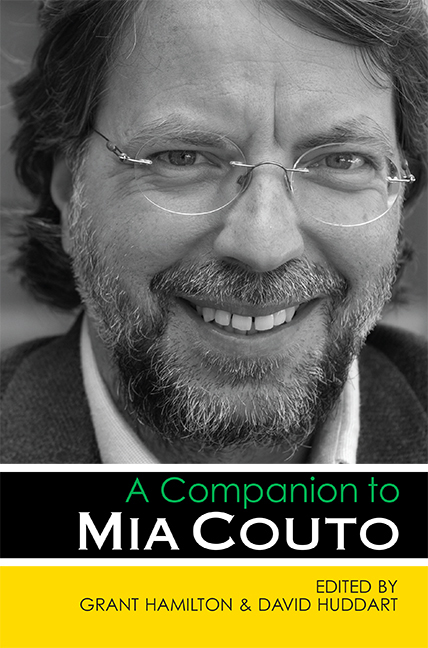Book contents
- Frontmatter
- Dedication
- Contents
- Acknowledgements
- Notes on Contributors
- Introduction
- An Interview with Mia Couto
- 1 Mia Couto in Context
- 2 Uma coisa fraterna Mia Couto & the Mutumbela Gogo Theater Group
- 3 Reading Raiz de orvalho Counterpointing Literary Genres in the Work of Mia Couto
- 4 Spaces of Magic Mia Couto’s Relational Practices
- 5 Mia Couto or the Art of Storytelling
- 6 The Multiple Worlds of Mia Couto
- 7 ‘Ask Life’ Animism & the Metaphysical Detective
- 8 Mia Couto & Translation
- 9 Jesusalém Empty Fathers & Women’s Texts
- 10 Trauma Repetition & Pure Repetition in The Tuner of Silences
- 11 Seeing Like a Crocodile Bird Mia Couto’s The Last Flight of the Flamingo
- 12 Mia Couto & Nostalgia Reading The Last Flight of the Flamingo
- 13 Mia Couto, Contexts & Issues A Bibliographic Essay
- Bibliography
- Index
2 - Uma coisa fraterna Mia Couto & the Mutumbela Gogo Theater Group
Published online by Cambridge University Press: 22 May 2021
- Frontmatter
- Dedication
- Contents
- Acknowledgements
- Notes on Contributors
- Introduction
- An Interview with Mia Couto
- 1 Mia Couto in Context
- 2 Uma coisa fraterna Mia Couto & the Mutumbela Gogo Theater Group
- 3 Reading Raiz de orvalho Counterpointing Literary Genres in the Work of Mia Couto
- 4 Spaces of Magic Mia Couto’s Relational Practices
- 5 Mia Couto or the Art of Storytelling
- 6 The Multiple Worlds of Mia Couto
- 7 ‘Ask Life’ Animism & the Metaphysical Detective
- 8 Mia Couto & Translation
- 9 Jesusalém Empty Fathers & Women’s Texts
- 10 Trauma Repetition & Pure Repetition in The Tuner of Silences
- 11 Seeing Like a Crocodile Bird Mia Couto’s The Last Flight of the Flamingo
- 12 Mia Couto & Nostalgia Reading The Last Flight of the Flamingo
- 13 Mia Couto, Contexts & Issues A Bibliographic Essay
- Bibliography
- Index
Summary
‘Odds are, tomorrow I’ll write just for the theater, or I’ll stop writing altogether’ (Laban 1998, 1022). Read today, against the backdrop of Mia Couto's pre-eminent stature as an award-winning, internationally recognized narrative prose writer, these words from a well-known interview conducted by the late Michel Laban more than two decades ago might sound incongruous. Yet in the early stages of his remarkably prolific career, Mia Couto apparently considered dramaturgy as a viable creative option. Focusing on a few representative examples, here I attempt to trace the character and scope of Couto's dramatic output, and understand it in the context of the theatrical activity happening in the urban centers during the turbulent transition between the revolutionary (1975–1986) and neo-liberal periods (1986 to present) in Mozambique. Concomitantly, I endeavor to broach the extent to which this largely collaborative theatrical practice corroborates Pius Nkashama's observation that theater in Africa normally functions as ‘the most important expression of conflicts, contradictions, as well as fundamental social complexities’ (1993, 11), and thus succeeds in catalyzing or symbolizing social change and political participation during an acutely fraught period of the country's history.
As Couto informs Laban, his collaboration with the Mutumbela Gogo theater company began in the late 1980s (Laban 1998, 1022), in the incipient stages of the neo-liberal dispensation, at a time when, as Couto puts it, the revolutionary ardor with which many of the artists of his generation were imbued was rapidly ebbing. A mere five or six years before, ‘literature in Mozambique was still very much marked by militant, explicitly political literature, placed at the service of the revolutionary cause’ (Laban 1998, 1000). As Mozambican writer and historian João Paulo Borges Coelho remarks, this period of socialist and revolutionary rule
was accompanied by the powerful emergence and total hegemony of the political sphere in the public life of Mozambique, and conversely a drastic reduction of the remaining spheres of social expression, including literature and its capacity to interpret the world autonomously. This new reality, brought into the cities from the rural sites of the armed struggle, was reinforced by a discourse of cohesion against a hostile environment in Southern Africa, headed by South Africa's apartheid regime.
- Type
- Chapter
- Information
- A Companion to Mia Couto , pp. 25 - 48Publisher: Boydell & BrewerPrint publication year: 2016



